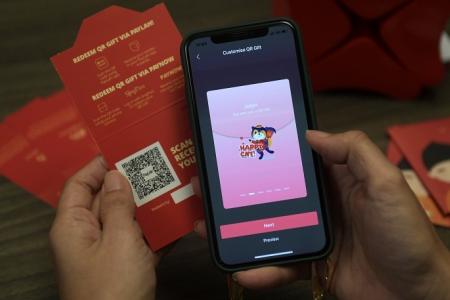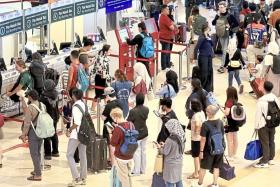Ditching the hassle of preparing hongbao by going digital
Expect to have a lighter wallet this Chinese New Year as the trend of electronic hongbao continues to grow.
More Singaporeans have been using digital hongbao instead of physical red packets since the use of e-hongbao was encouraged during the Covid-19 pandemic, with a high take-up rate in 2024, banks and fintech players told The Straits Times.
DBS Bank said that in 2024, the number of customers giving e-hongbao – in the form of a QR code – doubled year on year.
An all-time high of $39 million was gifted digitally, which contributed to a 7 per cent year-on-year reduction in cash withdrawals, said the bank’s spokesperson.
Ms Ng Lee Peng, OCBC Bank’s head of digital business in Singapore, said that 2024 was the first time “we saw the number of people sending e-hongbao outstrip the number of people withdrawing cash, either at the special CNY ATMs or the branches”.
She said that most digital hongbao givers were in their 30s and 40s, though the bank also noticed more people in their late teens and early 20s sending such hongbao in 2024.
Those aged 50 and above sent three times more e-hongbao in 2024, compared with in 2023, added Ms Ng, who expects more of them to do so in 2025.
Ms Ashley Thomas, head of strategy and operations at Revolut Singapore, said the fintech platform had “seen a strong upward trend” of money transfers during the first five days of Chinese New Year: an 80 per cent increase in 2023, and a further 40 per cent growth in 2024.
She added that while the volume of transfers has surged, the average transaction amount per transfer has decreased.
“This could be due to a shift towards more inclusive gifting, as users choose to split red packet amounts and send smaller gifts to a broader group of individuals, rather than larger sums to a few,” she said.
Revolut Singapore has also observed “significant growth” in foreign money transfers during the festive period, “approximately 35 per cent annually between 2022 and 2024”, added Ms Thomas. Popular currencies for these transfers included the Japanese yen and British pound.
Fellow fintech player YouTrip has seen a rise in users sending digital hongbao since it launched the initiative in 2021.
The number of e-hongbao sent surged tenfold in 2024 compared with in 2023, said Mr Kelvin Lam, chief operating officer of YouTrip.
He said users sent an average of seven e-hongbao in 2024, with the largest single e-hongbao amounting to $1,000.
“Among the 10 wallet currencies available on YouTrip Send, the Singapore dollar, Japanese yen and British pound emerged as the most popular choices for e-hongbao transfers,” said Mr Lam.
At British fintech company Wise, the festive period has also driven demand for money transfers, according to its product manager, Ms Chelsea Li.
While its customers appreciate e-hongbao as a way to remain connected with family and friends overseas during Chinese New Year, it is too soon to write off physical red packets.
Wise customers Ivan Tolic and Desmond Chew still prefer to hand out physical red packets when they can.
Mr Tolic, a 36-year-old business development manager in Singapore, first started sending digital hongbao to his family based in Malaysia during the Covid-19 pandemic.
“In Singapore, though, I still prefer giving physical hongbao and have not sent an e-hongbao locally yet.”
Mr Chew, an IT engineer, mostly gives out physical hongbao, though he observes that the digital versions are gaining traction.
The 48-year-old said: “I don’t mind sending e-hongbao, especially when I don’t have cash or physical red packets on hand, as I know younger people nowadays often prefer receiving them digitally.”
Get The New Paper on your phone with the free TNP app. Download from the Apple App Store or Google Play Store now


